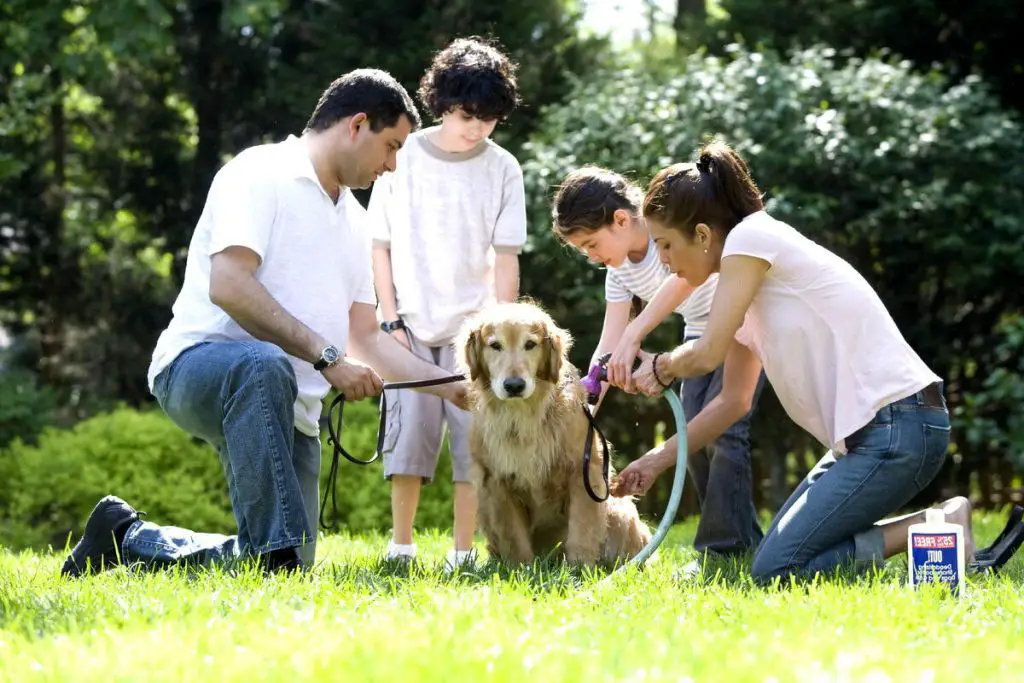Labradors are incredibly loving and playful dogs with an athletic build and a naturally devoted nature. You may be reading this article as you are looking into getting a Labrador pup. But, you might be concerned if a Labrador is a good fit for first-time owners.
There are many things to consider before bringing a puppy into your home. This is especially true if this is your first-ever experience of having your own dog.
In this article, we are going to talk about the Labrador breed and whether they are a good choice for first-time owners.
- Key Takeaway
- Is Labrador Good For First-Time Owners?
- Training Requirements – Is It Hard To Train a Labrador?
- Exercise Needs – How Much Exercise Does a Labrador Need?
- Grooming Requirements – Do Labradors Shed?
- FAQs
- Q: What are the main characteristics of a Labrador?
- Q: Are Labradors good with children?
- Q: Do Labradors require a lot of exercise?
- Q: Are Labradors easy to train?
- Q: Are Labradors good with other pets?
- Q: Do Labradors shed a lot?
- Q: Are Labradors prone to any health issues?
- Q: How long do Labradors usually live?
- Q: Are Labradors suitable for apartment living?
- Conclusion and final thoughts
Key Takeaway
- Labradors are generally regarded as a good choice for first-time owners due to their friendly and adaptable nature, easy trainability, compatibility with children and other pets, and their need for physical and mental stimulation.
- Training a Labrador is typically not considered hard due to their intelligence, eagerness to please, and quick learning ability, however, consistent engagement, positive reinforcement, regular exercise, and early socialization are key factors in the training process.
- A healthy adult Labrador typically requires about one hour of exercise per day, which can be adjusted to 45 minutes for more relaxed individuals, while a Labrador puppy should follow the rule of five minutes of exercise per month of age (up to twice a day).
Is Labrador Good For First-Time Owners?

Yes. Over many years and through careful selective breeding, the Labrador has proven to be an incredibly trustworthy and reliable dog both out as working dogs and in a home environment which makes them an amazing breed for a first-time dog owner.
The Labrador has a naturally devoted nature and is known to be loyal and caring towards its owner Labradors are playful but they are also easy-going dogs that display a wonderful temperament.
Labradors are well renowned for their sensitive nature as you may already be aware of after seeing lots of Labradors for service assistants and therapy dogs. They are playful dogs that desire love and affection from their human companions.
Labradors are known to be great dogs for the family, especially with children due to their sensitive and affectionate nature. Alongside their dependable companionship, their well-balanced temperament is inherent to them.
But, as with all dog breeds, you are required to provide them with lots of socialization from a young age with strangers and other animals for them to grow into good-natured and well-rounded adult dogs.
Although they need quite a bit of care and attention, they are an incredibly good choice for a first-time dog owner who is after a dog that is loyal and affectionate.
It is their kind and extremely willing nature that makes them relatively easy to train. Their love for their human companions makes them extremely eager to please you.
They benefit greatly from knowing who their leader is and their place in their pack. A Labrador’s high intelligence means that they love to engage in different mentally stimulating activities. This can make training this breed relatively easy.
Training Requirements – Is It Hard To Train a Labrador?

Generally speaking, it usually takes several weeks or even months to train a labrador. With patience and consistency, you can teach your labrador tricks, manners, and behaviors that will last a lifetime.
As with all breeds, you need to be willing to put in the time and effort to train your dog. Although the labrador is renowned for its loving and easy-going temperament, they can easily develop unwanted bad habits and destructive behaviors if they’re not trained properly and consistently from puppyhood.
They adore being praised and have a high food drive. So, this type of reward can come in handy when training your pup.
One of the great things about labradors is that they are incredibly intelligent dogs. This means that they are usually quick learners who catch on to new commands and tricks relatively quickly.
However, it also means that they can sometimes get bored with repetitive tasks or become distracted easily. For this reason, it’s important to keep training sessions interesting and varied. Use different toys, treats, and activities to keep your dog’s attention.
One of the first things you will want to train your Labrador is basic obedience commands; such as sit, stay, come, down, etc. These are essential for having a well-behaved dog and will give you a good foundation to work with when teaching other tricks or behaviors.
Start with short training sessions (no more than 15 minutes at a time). Then gradually increase the length as your dog gets better at following commands. Be sure to praise and reward your Labrador when it does something correctly!
After your Labrador has mastered basic obedience, you can begin teaching more advanced tricks or behaviors. Some popular ones include fetching, rolling over, playing dead, shaking hands/paws, and even agility training.
Exercise Needs – How Much Exercise Does a Labrador Need?
Labradors need a minimum of two hours a day of exercise. They are very loving dogs and thrive off their human attention. If they are left alone for too long, they can become very distressed and develop destructive behaviors.
Labradors are well-built and strong dogs with a very athletic build. This means that they need a large amount of exercise.
Originally, the Labrador was bred to work alongside fishermen in Canada. This meant a lot of hard work, swimming, and retrieving for long hours of the day. They are commonly used as working dogs and in hunting environments retrieving games for the hunters.
That double coat protects the dog from the cold and water which enables them to be great hunting companions and definitely explains their love for swimming.
Exercise for the Labrador should be a combination of daily walks and offline runs with plenty of playtimes and mental stimulation. Their large amounts of energy need to be released to prevent any bad habits and behaviors from developing.
Also, Labradors are commonly known to become easily obese if not exercised and fed properly. So, they need appropriate levels to stay fit and healthy.
As a retriever, it’s in their blood to want to retrieve. So, teaching your dog to retrieve is a great way to exercise them as it uses physical and mental energy.
Social interaction with other people and dogs is important for Labrador due to its naturally social nature which also provides a lot of mental stimulation say ZigZag Dog.
Grooming Requirements – Do Labradors Shed?

Yes, Labradors do shed. They are considered a “medium-shedding” breed, which means they lose a moderate amount of hair. However, the amount of shedding can vary greatly from dog to dog. Some Labradors shed very little, while others shed quite a bit.
There are a few things you can do to minimize shedding; such as brushing your dog regularly and using special shampoo and conditioner designed for shedding dogs.
Brushing your Lab will help reduce the amount of hair they shed. However, it’s important to understand that Labs are heavy shedders and no amount of brushing will completely stop the shedding.
Labrador coats are designed to protect them from cold water and icy weather. They have a thick, waterproof outer coat and a softer, insulating undercoat. The undercoat is shed twice a year in what’s called “blowing coat”. During this time, you may find dog hair everywhere!
While it can be frustrating, it’s perfectly normal. Just be patient and brush your Lab regularly to help manage the shedding.
The amount of time you spend brushing your Labrador will depend on the thickness and length of their coat. A good rule of thumb is to brush for at least five minutes per week. If your dog has a longer or thicker coat, you may need to brush for closer to ten minutes per week.
How often you brush your Labrador will also depend on their individual coat type. Some dogs can go several days without being brushed, while others may need to be brushed daily.
FAQs
Q: What are the main characteristics of a Labrador?
A: Labradors are medium to large-sized dogs with a sturdy build. They have a short, dense coat that comes in various colors such as black, yellow, and chocolate. Labradors are known for their friendly and outgoing personality. They are also highly energetic and enjoy being part of family activities.
Q: Are Labradors good with children?
A: Labradors are generally excellent family dogs and are known for their patience and tolerance with children. They are gentle and affectionate, making them great companions for kids of all ages. Labradors are also usually very protective of their family members, including children.
Q: Do Labradors require a lot of exercise?
A: Yes, Labradors are an active breed and require regular exercise to keep them mentally and physically stimulated. Daily walks, playtime, and activities such as swimming or retrieving games are recommended to fulfill their exercise needs. Labradors who do not get enough exercise may become bored and exhibit destructive behavior.
Q: Are Labradors easy to train?
A: Labradors are known for their intelligence and eagerness to please their owners, which makes them relatively easy to train. They respond well to positive reinforcement techniques and enjoy learning new commands and tricks. Consistency, patience, and positive rewards are key when training a Labrador.
Q: Are Labradors good with other pets?
A: Labradors generally get along well with other pets, including cats and other dogs. However, proper socialization from a young age is important to ensure they develop good manners and appropriate behavior around other animals. Introducing a Labrador to other pets gradually and under controlled circumstances is recommended.
Q: Do Labradors shed a lot?
A: Yes, Labradors are moderate to heavy shedders. They have a double coat that protects them from various weather conditions, and they shed their old or damaged hair regularly. Regular brushing can help manage the shedding, but expect to find Labrador hair on furniture and clothing, especially during shedding seasons.
Q: Are Labradors prone to any health issues?
A: Labradors are generally healthy dogs, but like any breed, they can be prone to certain health issues. Some common health concerns for Labradors include hip and elbow dysplasia, obesity, and certain eye problems such as cataracts or progressive retinal atrophy. Regular veterinary check-ups and a healthy diet can help prevent or manage these issues.
Q: How long do Labradors usually live?
A: On average, Labradors have a lifespan of 10-12 years. However, with proper care, nutrition, and regular vet check-ups, some Labradors can live beyond 12 years. It’s important to provide them with a balanced diet, regular exercise, and lots of love and attention to ensure they lead a healthy and happy life.
Q: Are Labradors suitable for apartment living?
A: While Labradors are typically larger dogs, they can adapt to apartment living if provided with sufficient exercise and mental stimulation. However, it’s important to note that Labradors have high energy levels and may require more space to roam and play compared to smaller breeds. Regular exercise and access to outdoor areas are crucial for their well-being in an apartment setting.
Conclusion and final thoughts
In conclusion, Labradors are excellent dogs for first-time owners. They are friendly and intelligent, which makes them easy to train.
Labradors are also very loyal and devoted to their owners, making them great companions. Additionally, with the right amount of exercise and stimulation, they can be a great addition to any family.
If you’re looking for a dog that is friendly, intelligent, and loyal, the Labrador Retriever is an excellent choice.




